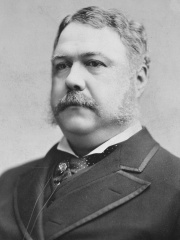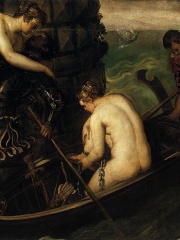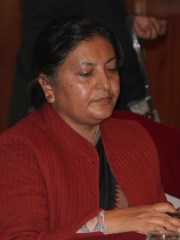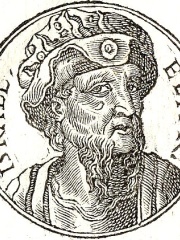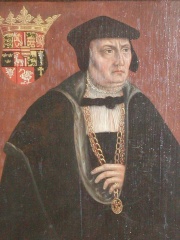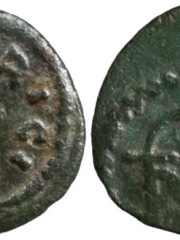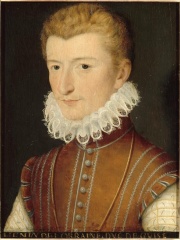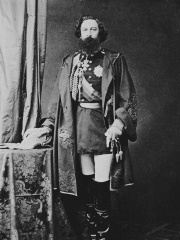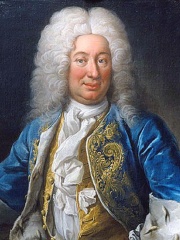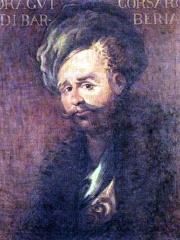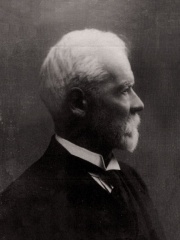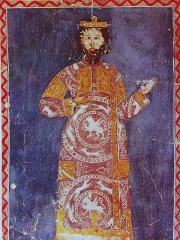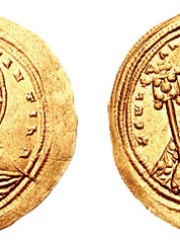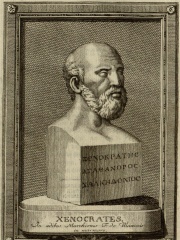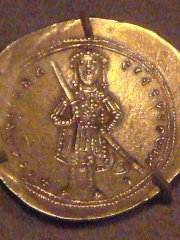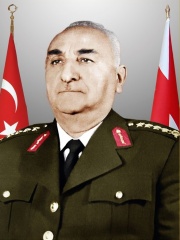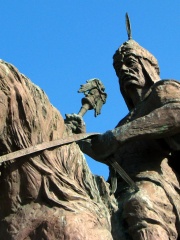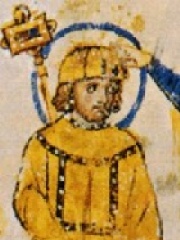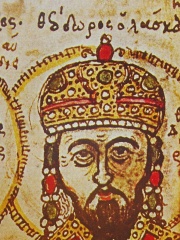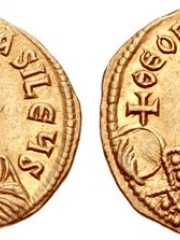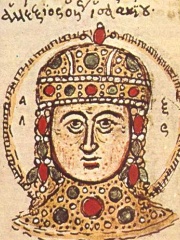POLITICIAN
Memnon
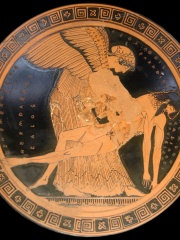
 Memnon
Memnon
In Greek mythology, Memnon ( ; Ancient Greek: Μέμνων, lit. 'resolute') was a king of Aethiopia and son of Tithonus and Eos. During the Trojan War, he brought an army to Troy's defense and killed Antilochus, Nestor's son, during a fierce battle. Nestor challenged Memnon to a fight, but Memnon refused, as there was little honor in killing such an aged man. Nestor then pleaded with Achilles to avenge his son's death. Read more on Wikipedia
His biography is available in 36 different languages on Wikipedia (up from 35 in 2024). Memnon is the 1,735th most popular politician (up from 3,560th in 2024), the 226th most popular biography from Türkiye (up from 377th in 2019) and the 125th most popular Turkish Politician.
Memnon is most famous for being the colossus of the ancient city of Thebes, Egypt. It is a statue that was erected in honor of Amenhotep III, who ruled from 1386 to 1349 BC.
Memorability Metrics
Page views of Memnon by language
Among POLITICIANS
Among politicians, Memnon ranks 1,735 out of 19,576. Before him are Robert Fico, José Eduardo dos Santos, Chester A. Arthur, Arsinoe IV of Egypt, Bidhya Devi Bhandari, and King Elah. After him are Frederick I of Denmark, Theuderic I, Henry I, Duke of Guise, Ferdinand II of Portugal, Fidel Ramos, and Frederick I of Sweden.
Most Popular Politicians in Wikipedia
Go to all RankingsRobert Fico
1964 - Present
HPI: 73.08
Rank: 1,730
José Eduardo dos Santos
1942 - 2022
HPI: 73.08
Rank: 1,731
Chester A. Arthur
1829 - 1886
HPI: 73.08
Rank: 1,732
Arsinoe IV of Egypt
68 BC - 41 BC
HPI: 73.07
Rank: 1,733
Bidhya Devi Bhandari
1961 - Present
HPI: 73.07
Rank: 1,734
King Elah
1000 BC - 960 BC
HPI: 73.07
Rank: 1,735
Memnon
HPI: 73.07
Rank: 1,736
Frederick I of Denmark
1471 - 1533
HPI: 73.07
Rank: 1,737
Theuderic I
485 - 534
HPI: 73.07
Rank: 1,738
Henry I, Duke of Guise
1550 - 1588
HPI: 73.07
Rank: 1,739
Ferdinand II of Portugal
1816 - 1885
HPI: 73.07
Rank: 1,740
Fidel Ramos
1928 - 2022
HPI: 73.06
Rank: 1,741
Frederick I of Sweden
1676 - 1751
HPI: 73.06
Rank: 1,742
In Türkiye
Among people born in Türkiye, Memnon ranks 226 out of 1,347. Before him are Dragut (1485), Henri Fayol (1841), Alexios V Doukas (1140), Constantine VIII (960), Xenocrates (-396), and Şah Sultan (1509). After him are Isaac I Komnenos (1007), Sabiha Gökçen (1913), Cemal Gürsel (1895), Fatma Sultan (1500), Anitta (-1700), and Kayqubad I (1188).
Others born in Türkiye
Go to all RankingsDragut
MILITARY PERSONNEL
1485 - 1565
HPI: 73.33
Rank: 220
Henri Fayol
ECONOMIST
1841 - 1925
HPI: 73.33
Rank: 221
Alexios V Doukas
POLITICIAN
1140 - 1204
HPI: 73.31
Rank: 222
Constantine VIII
POLITICIAN
960 - 1028
HPI: 73.28
Rank: 223
Xenocrates
PHILOSOPHER
396 BC - 314 BC
HPI: 73.16
Rank: 224
Şah Sultan
POLITICIAN
1509 - 1572
HPI: 73.12
Rank: 225
Memnon
POLITICIAN
HPI: 73.07
Rank: 226
Isaac I Komnenos
POLITICIAN
1007 - 1060
HPI: 72.98
Rank: 227
Sabiha Gökçen
PILOT
1913 - 2001
HPI: 72.98
Rank: 228
Cemal Gürsel
POLITICIAN
1895 - 1966
HPI: 72.90
Rank: 229
Fatma Sultan
NOBLEMAN
1500 - 1573
HPI: 72.87
Rank: 230
Anitta
POLITICIAN
1700 BC - 1740 BC
HPI: 72.85
Rank: 231
Kayqubad I
POLITICIAN
1188 - 1237
HPI: 72.75
Rank: 232
Among POLITICIANS In Türkiye
Among politicians born in Türkiye, Memnon ranks 125. Before him are Michael I Rangabe (770), Theodore I Laskaris (1174), Michael II (770), Alexios V Doukas (1140), Constantine VIII (960), and Şah Sultan (1509). After him are Isaac I Komnenos (1007), Cemal Gürsel (1895), Anitta (-1700), Kayqubad I (1188), Glycerius (430), and Alexios IV Angelos (1182).
Michael I Rangabe
770 - 844
HPI: 73.53
Rank: 119
Theodore I Laskaris
1174 - 1221
HPI: 73.36
Rank: 120
Michael II
770 - 829
HPI: 73.34
Rank: 121
Alexios V Doukas
1140 - 1204
HPI: 73.31
Rank: 122
Constantine VIII
960 - 1028
HPI: 73.28
Rank: 123
Şah Sultan
1509 - 1572
HPI: 73.12
Rank: 124
Memnon
HPI: 73.07
Rank: 125
Isaac I Komnenos
1007 - 1060
HPI: 72.98
Rank: 126
Cemal Gürsel
1895 - 1966
HPI: 72.90
Rank: 127
Anitta
1700 BC - 1740 BC
HPI: 72.85
Rank: 128
Kayqubad I
1188 - 1237
HPI: 72.75
Rank: 129
Glycerius
430 - 480
HPI: 72.70
Rank: 130
Alexios IV Angelos
1182 - 1204
HPI: 72.69
Rank: 131


